Miasanrot Awards: Place 15-12
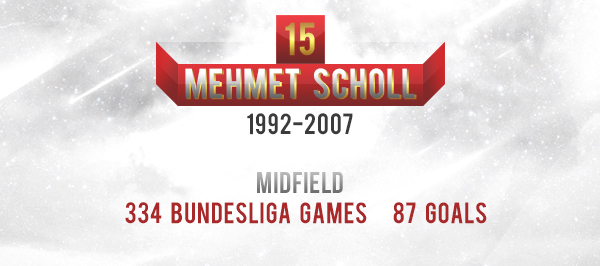
15th place: Mehmet Scholl
by Maurice Hauß
Mehmet Scholl was a dribble king from Bayern’s own ranks. He was, of course, also a teen idol and a fan favourite. Unfortunately he was also a player whose career constantly suffered from injuries.
Jump back in time to the year 2003, to the derby at the Olympic Stadium. Bayern had just been knocked out of the Champions League at the time, and as a result the local battle was unceremoniously nominated as the European Cup stand-in. Just after an hour it was goalless when Scholl placed the ball for a free-kick. The man from Karlsruhe had always been able to take free-kicks: inside of the foot, over the wall, and into the corner. And that’s exactly what he did on this occasion as well. What followed was one of the heaviest derby defeats for the Blues. Scholl dinked it over goalkeeper Jentzsch shortly after for 2-0, and following a goal each from Lizarazu and Pizarro he made it 5-0 himself. At that moment, the Champions League is far away. FC Bayern win the derby after a show of strength and an exceptional performance from Scholl.
All of that is still far away when in summer 1992 the 22-year-old Scholl moves from tranquil Karlsruhe to Munich. He had been Uli Hoeneß’s dream player for some time, according to the media, and he had scored eleven goals in 58 league games for Karlsruhe. Scholl, the young whirlwind on the flank, was the name on everyone’s lips.
In a Bayern team that found itself in the midst of an upheaval, Scholl makes friends quickly. In his first season he appears in as many as 33 games. In total it would become 334 games in which he scores 87 goals himself and sets up another 78 for his team-mates. When he ends his career in 2006, he is the first player to win eight German championships.
While during Trapattoni’s first term in charge Scholl grows slowly into the role of playmaker and conductor, before the 1995/96 season the two newcomers Herzog and Sforza were plonked in front of his face. By the end of the season, however, he has battled back to get the status of being the number one in Bayern’s midfield.
In the closing stages of the season, Scholl shows perhaps his best football. On the biggest of all stages, in the Camp Nou in front of 115,000 spectators in the return leg of the UEFA Cup semi-final, he experiences an absolute moment of glory. After drawing 2-2 late on in the first leg, Bayern travel with a young team to Catalonia as underdogs. But Scholl dominates in left-midfield and shows what kind of influence he can have on a whole game. His dribbling and end product, among others, are at the forefront of the goal to go 1-0 up through Babbel. Bayern win 2-1 and advance to the final.
In the following years, Scholl has to battle with injuries and personal problems. In Trapattoni’s second stint in office, he struggles to get along with the latter’s defensive football. Through gritted teeth, Scholl acknowledges the signature of Effenberg as midfield general, but finds his bearings more and more under Hitzfeld with his role as a “supporter”.
Under Magath, Scholl increasingly becomes an elegant super-sub in a midfield built around stars Ballack and Zé Roberto. The many short appearances did, however, eventually extend his career in view of his injury history.
Scholl’s time at Bayern includes all of the highs and lows of recent times. Scholl was there for the turbulent 90s with many coaches as well as the UEFA Cup triumph of 1996. In the 1999 final in Barcelona the European champion is subbed on, hits the post and has to watch on at the end as the Red Devils storm jubilantly across the pitch. Two years later in Madrid against Valencia he plucks up his courage and takes the penalty in the seventh minute at one-nil down. Cañizares saves. Scholl plays all the way into extra-time. He watches on from the bench as Oliver Kahn makes himself invincible in the grand finale.
When Scholl is asked for his three favourite titles, the three that occur to him are his first title in 1994, the Leverkusen Waterloo moment in 2000 as well as the last-minute celebrations after the Patrick Andersson indirect free-kick of 2001.
The only dream to remain out of Scholl’s reach is taking part in a World Cup. In 1994 and 1998 Scholl isn’t considered. Before the 2002 World Cup he has to withdraw due to injury. In the World Cup hosted by Germany in the year of his retirement, there is likewise no place for Bayern’s elegant super-sub in Jürgen Klinsmann’s squad.
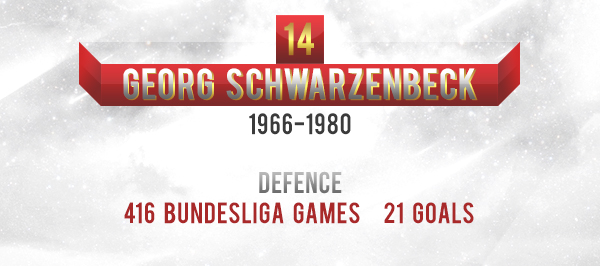
14th place: Hans-Georg Schwarzenbeck
by Maurice Hauß
Quiet, local hero and of course Madrid 1974. When one thinks of the centre-half Hans-Georg “Katsche” Schwarzenbeck, these terms inevitably come to mind.
“Two legs, no interest in ingenuity, simplified mechanism, nothing Brazilian.” That was how Wolf Wondratschek once waxed lyrical about “Katsche”, as he was always called by everyone. Comedian Atze Schröder took a similar tack when he said: “Back in the days, there was still someone like Katsche Schwarzenbeck. 460 Bundesliga games, no ball contact. For 20 years he thought, that leg will grow back.”
Schwarzenbeck is a Munich local through and through. He starts to play for the Reds on Säbener Straße at the age of thirteen. Shortly after his 18th birthday, Čajkovski plucks him out of the academy into the senior side. He meets a young squad in their second year in the Bundesliga. The others are called Sepp, Gerd, and Franz. From the start Katsche bows to the idea of the team – it’s the others who should lead and speak.
Katsche develops a particularly strong bond with Franz Beckenbauer. While the “Kaiser” has every freedom in attack and gracefully dictates Bayern’s game, the centre-half Schwarzenbeck has to have his back. That is also why he gave himself the rule of never going beyond half-way. “The Kaiser’s Cleaner” establishes itself as a nickname.
But that name isn’t meant disparagingly. It stands, simply, for everything that Katsche is as well: a tireless worker, who never complains about the absent appreciation or the lack in public interest; a rigorous defender whose gaze makes opposing strikers tremble in their boots; a conscientious sweeper who carries out challenges with the necessary hardness, but also the required caution. If the Kaiser was the star surgeon at the Bellevue, then Katsche was the butcher in the local meat market around the corner.
Our blog-historian Tobias Günther explains the cooperation between Beckenbauer and Schwarzenbeck as follows: “Beckenbauer as incarnation of pressing resistance happily let strikers close him down before poking the ball with tantalising cool at the last moment past the opponent. Those passes landed regularly at the feet of Schwarzenbeck, so he always had to be fully switched on when Beckenbauer had the ball. As such he was more than just the Kaiser’s safety wheels.
Here he was often more or less “compelled” into forays and actions that he wouldn’t have taken on of his own accord. Beckenbauer also knew exactly who he could give the ball to. He didn’t challenge Schwarzenbeck with chipped balls at shoulder height. The Kaiser took the risk onto himself, walking almost voluntarily into a trap to be able to get the ball through to him. As a result Schwarzenbeck often had ten metres of free space in front of himself and wasn’t under pressure.
All in all, the relationship can be described as a perfect symbiosis. Schwarzenbeck did everything that the Kaiser only wanted to show in case of emergency. Heading, tracking back, tackles… that was Schwarzenbeck’s line of work. It was more than just enough for the time.”
Local and around the corner – Schwarzenbeck was that as well. While Beckenbauer goes to the US and Breitner to Madrid, Katsche stayed true to Bayern. Why should he leave anyway? Where should he even go? In interviews today the defender reports of offers from Berlin and Manchester with a wink. He says, however, that he never really considered them.
Until the end of his career in 1981, Katsche stays at FC Bayern. In his nearly fifteen years, he makes 416 appearances in the Bundesliga. He collects more and more titles. He wins the championship alone six times, the cup three times. Other than that he wins four European trophies, including the trophy hat-trick in the European Cup.
And of all tournaments, it’s in that one that it comes after all. That one moment in which Katsche steps forward out of the shadow of Beckenbauer, Müller and co and into the spotlight. Without that moment, Schwarzenbeck’s story wouldn’t be complete. Every interesting biography needs that one special moment in which the protagonist briefly breaks character.
For Katsche, that’s the 15th of May 1974. In Bruges’s Heysel Stadium, the last seconds of the match between Bayern Munich and Atlético Madrid are ticking away. It’s the first final at the European peak for the Bayern team that had just won three league titles in a row. But this final, of all finals, isn’t going right. The future Spanish national coach Luis Aragones had put Madrid in the lead with a free-kick in the 114th minute and now time is running out for the Reds.
Schwarzenbeck gets the ball played to him on the halfway line and runs towards Atlético’s goal. Nobody closes him down. Why would they? If there had been a comprehensive scouting report at the time, it would presumably have been noted that the big German in defence could be happily allowed to have the ball. Better to cover Beckenbauer, just make sure Müller doesn’t get the ball.
But Katsche just plucks up his courage and has a go from almost 30 metres out. Later Beckenbauer will wind him up by saying that Schwarzenbeck only shot because nobody else was free and he didn’t know where to go with the ball. Yet the ball now flies between and through the Spanish defenders towards the goal, where goalkeeper Reina stretches but can’t get a hand to it. The ball hits the back of the net in the bottom left corner.
In the recordings, you barely see Katsche celebrate after. In perhaps the biggest game of his career so far, he gets the equaliser almost on the final whistle, earning Bayern a replay, and isn’t pleased. His thoughts were already on the replay, he says later. Maybe though they were also on the post-match interviews that he’d now certainly have to give. “Well Gerd clearly should have scored,” said the goal-scorer later into the microphone.
The replay gives no cause for concern. Two days after the first battle Bayern win 4-0, winning the European Champions Cup for the first time. The beginning of a three-year reign in European football.
Alongside FC Bayern, obviously his one and only, Schwarzenbeck also plays for the German national team. On the same side as his Bayern colleagues he becomes European champion and world champion. All in all, he plays 44 caps with the eagle on his chest. As his shadow he’s also an important stabiliser and allows the Kaiser to express himself.
In 1981, however, at the young age of 32, Schwarzenbeck has to end his career. A torn Achilles forces him to miss the entirety of the 1980/81 season. After the year he decides to end his active time. Fitting to his character, Katsche doesn’t become a coach or a manager, but takes over his aunt’s stationary shop. Today, he provides FC Bayern’s offices with office materials and magazines. Katsche simply stayed with FC Bayern.
In closing, the words of the poet Wondratschek resound in one’s ear: “And in spite of that, somebody who is commemorated by those who saw him.”
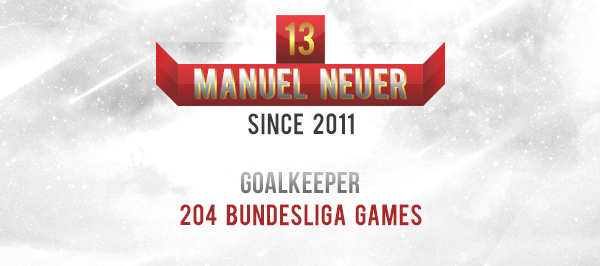
13th place: Manuel Neuer
by Tobias Hahn
World Cup winner, Champions League winner, German champion, cup winner, best goalkeeper in the world. These are just the most important accolades and cups that Manuel Neuer has been able to collect in his career already. Just that list is enough to justify his place in this list. Just reducing him to his titles, however, would not do the Gelsenkirchen-born goalkeeper justice.
The former Schalke man is much more than just a collector of titles. On the outside he looks calm and relaxed. Rarely is he seen to be excessively emotional after defeats: Manuel Neuer is a model pro. But if you follow the goalkeeper more closely, you can perceive what kind of ambition lies within him. Even when he was already right at the top, he always tried to improve himself further in all aspects. His game with the ball in particular made a further leap after he won the Champions League and World Cup. Without dogged ambition and the proclivity for perfection, that probably isn’t possible. It’s not for nothing that Neuer describes himself as a “player hungry for success”.
Yet in his long career at FC Bayern that hasn’t always been straight-forward for him. When the rumours were circling about a transfer to Munich in the 2010-11 season, there was substantial resistance for the then-Schalke player. Not only from his own fans, but also from many Bayern fans. A dyed-in-the-wool Schalke man, his role model wasn’t Oliver Kahn, but his long-term competitor Jens Lehmann, and on top of that a young goalkeeper in Bayern’s academy, Thomas Kraft, was making a big impression. All of that led to the birth of the “Koan Neuer” [Bavarian for “No Neuer”] campaign. At the DFB Pokal semi-final of 2011 in Munich, Neuer got the full nine yards. “Koan Neuer” posters, banners, whistles and insults. On that day, part of the fans showed their worst side. Yet Neuer remained cool, played his part in his team’s victory and got the game over the line professionally.
A typical Neuer, calm, professional, and constantly focused on his performance and that of his team. Only at his last away game before the move to Munich did his emotions boil over for the then 25-year-old too. After the victory he ran, like Oliver Kahn in 2001, to the corner flag and celebrated with it. In 2001, as a fan at the time, he suffered with his Schalke, when the championship trophy was snatched from their hands in the final second.
Correspondingly, at the beginning of his time in Munich, Neuer didn’t have the easiest of situations. Over long stretches of his first season that remained the case. Big performances, but also mistakes that cost three points, were all part of it for the newcomer. The switch to suddenly only be facing two or three shots on goal, but then to always have to fend those off, was tough for Neuer. However, he improved in that respect in his first season. Because eventually his strong performances were also decisive in Bayern’s Champions League progress, and the related “Finale dahoam” [Bavarian for “final at home”]. The game against Chelsea will probably still remain with every Bayern fan. Ecstasy after Müller’s goal to make it 1-0, the sobering moment when Drogba scored, and Arjen Robben’s missed penalty.
Looking back, a lot was made of Arjen Robben’s missed penalty and many important players not stepping up in the penalty shoot-out. There was a question about leaders in the team. However, Manuel Neuer showed leadership qualities that evening. His team needed a taker, so Neuer grabbed the ball and converted, on the outside a rather quiet leader like his team-mates Lahm and Schweinsteiger.
After the final defeat in 2012, the goalkeeper questioned himself and in the following year showed more consistent performances. Neuer alone is to be thanked for Bayern not going behind in the 2013 final against Dortmund. His saves gave Dortmund cause for doubt, and helped Bayern to get through the difficult initial phase of the game. In the years after Neuer was a constant component of a team that defined an era at Bayern and also enjoyed great success with the German national team. In the mean-time he has even become captain, and a leader who can be a role model with his professionalism and ambition. Manuel Neuer does get loud sometimes too, but after almost every goal conceded the arm going up in protest is more obvious than loud orders.
Neuer is convincing through consistently world class performances, and it’s not for nothing that Gianluigi Buffon sees him as one of the best goalkeepers. The Italian legend simply sums up Neuer perfectly: “He gives his team calm with his aura, is strong on the ball and also saves the impossible ones.” A player who has been and still is a permanent component of one of the most successful eras in FC Bayern’s history. We can just hope that Manuel Neuer can battle back to his old level of performance after his heavy injury. It will be a difficult path, but if there’s one player capable of that, then it’s the goalkeeper from Gelsenkirchen.
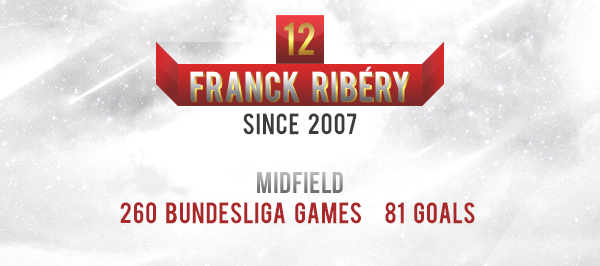
12th place: Franck Ribéry
The decisive moment in which Bayern player Franck Ribéry became the Bayern legend Franck Ribéry probably took place on the 23rd of May 2010. The evening before, FC Bayern had lost the Champions League final against Inter Milan in Madrid, probably in part because Ribéry was suspended. The European Cup season had been an excursion into heights of international football long not seen; with Arjen Robben, Ribéry, Bastian Schweinsteiger, Philipp Lahm and the young Thomas Müller there was a team in Munich fit for the future, and yet precisely during their emergence it felt more like an excursion and not like the lasting step up to the status of international top club.
Yet it was Franck Ribéry who changed that impression. On the balcony of the town hall, he announced that he had extended his contract for five years. The club’s most important player, eyeballed by Chelsea, Real and other big clubs, decided to stay in Munich – that was a statement with charisma and had enormous influence on the following years. And it wasn’t the first time that the Frenchman represented a symbolic figure for FC Bayern’s football.
Early in 2007, in the truly dark final stages of the Magath era, a period change was in the offing. For the first time, Bayern were really going to use their money to strengthen the team. Luca Toni came in, Miroslav Klose too, and above all stood the signing of a seemingly troublesome but overall skilful talent from Boulogne-sur-Mer on the coast in Northern France, who had already ended his career once to work as a construction worker.
Franck Ribéry’s early time in Munich can be told quickly, as it concerns one of the most convincing title wins in Bundesliga history under Ottmar Hitzfeld. A season that was so good that a sporting goods producer decided at some point to hang up a 40-metre-high poster at Munich’s Odeonsplatz that portrayed Ribéry with a flowing mink cloak and a crown. Signature: “Bayern has a king again.” The story, however, also concerns the departure of the Kahn generation and a difficult transition under Jürgen Klinsmann, which Ribéry also had to suffer and perhaps led him to consider a transfer already. And it concerns a process in which Ribéry had to defend himself against the accusation of having had sexual intercourse with an underaged prostitute.
To what extent the understanding and familial reaction of FC Bayern (or rather Uli Hoeneß) towards this private escapade had an influence on his further career later down the line is hard to say. Yet under Louis van Gaal it showed that in Munich people didn’t just stand together as a family, but also had a plan and that the French left midfielder played an eminently important role in it. He stayed, then; he lived through another difficult phase with Van Gaal’s end; and in Jupp Heynckes he got to know a coach that gave him exactly what he needed: affection and joy. All of that contributed to Ribéry winning the Champions League in 2013 and becoming FC Bayern’s fifth player after Gerd Müller, Franz Beckenbauer, Karl-Heinz Rummenigge and Lothar Matthäus to receive an individual accolade. Ribéry became Europe’s Footballer of the Year ahead of Lionel Messi and Cristiano Ronaldo, and also came third in the World Footballer of the Year vote.
The role that Ribéry took on in the years after his career high-point was a little less significant. Under Pep Guardiola he became a part of the system, and didn’t have to do everything himself anymore, as in the years previous to that. He got injured repeatedly and then voices would pipe up that criticised the hot-headed, immature Ribéry who still often didn’t keep himself under control and who as a result constantly represented a complete contrast to his partner Arjen Robben, with whom he got along well first of all, then for a while not at all, and by the end excellently. Ribéry stood for and stands for playfulness, the leisurely life and a natural, unprofessional attitude towards the existence of the footballer.
At some point, when Franck Ribéry leaves FC Bayern, probably in the coming summer, even if it still doesn’t seem set in stone, a footballer will depart having decisively shaped this club, a footballer who was Bayern’s king for a long time and who represented a symbolic figure who will always be remembered. Even if the poster on Odeonsplatz was taken down long ago.



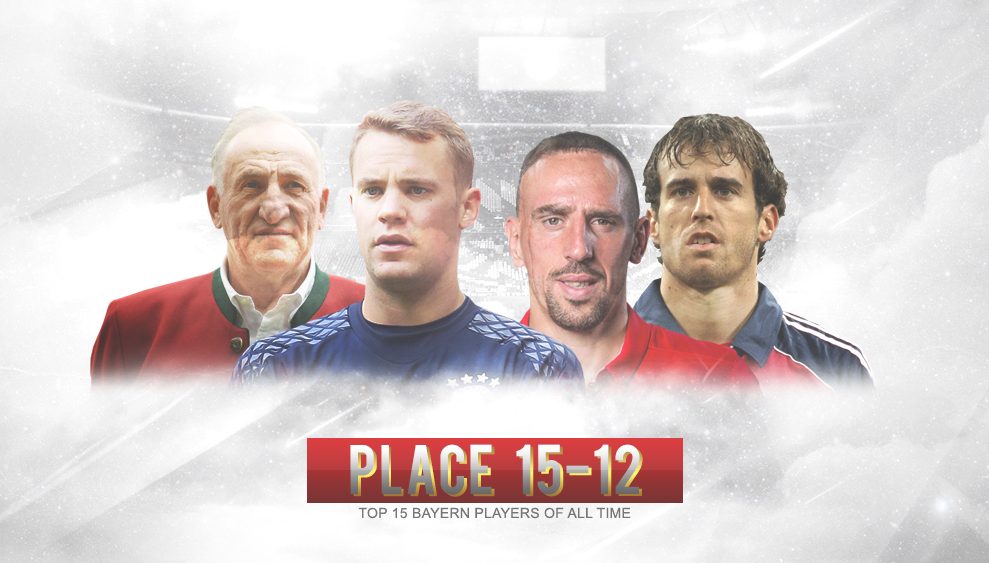








Ribery va messo molto più avanti min. 3o